30 Worst Things Dads Can Say to Their Kids
"Great job" isn't such a great thing to say.

Fact: what you say to your children matters.
According to a study published in Acta Pediactrica, children are more likely to succeed later in life if their fathers are present and if they communicate important information in effective ways at regular intervals. But a lack of communication—or worse: regularly ineffective communication—can actually cause your children long-lasting harm. For instance, if you berate your kid in a time of high stress, they're going to internalize your (likely mean) words, and come out for the worse. To make sure you're only saying the best stuff at the best times, steer clear of hurling these negative phrases at your kid.
1
"I do everything for you."

Yes, we get it—you're at least providing a good portion of your income to sustain your family, all while being completely selfless and loving. But saying this to your kids will only make them feel constantly ungrateful, even if they aren't, says Brad M. Reedy, Ph.D., co-founder and clinical director of Evoke Therapy Programs and author of The Journey of the Heroic Parent: Your Child's Struggle and the Road Home.
2
"'B' is fine, but an 'A' is better."

According to a study published in the Journal of Personality and Social Psychology, putting all of the emphasis on grades and academic achievement from a young age will actually make your child perform worse in school. While it's nice to think that your kid is a genius, it's better to encourage them to fail and pursue other creative endeavors as well.
3
"I used drugs when I was a kid."

Saying this to a kid is pretty much giving them the go-ahead to experiment, says Dennis Poncher, author and founder of the support group network Because I Love You. Instead of taking the tough-guy or cool-dad approach to this subject, have an honest conversation with your kids about it. You may have engaged in illicit behavior when you were younger, but that doesn't mean that they should follow down that same path.
4
"It's not that big a deal."

When your kid is stressing over something, it can be easy to shrug off issues that don't seem as stressful to you. Unfortunately, this practice can make your child feel shame for possessing emotions and anxiety. Instead of shaming their emotion, acknowledge them and talk openly about their feelings.
5
"You're fine!"

When your child is suffering from any number of injury—from mild knee scrapes to broken bones (ouch!)—the last thing that you want to do is brush off their pain. In fact, they're not fine. And that's okay! In these situations, it's important to stay patient and validate their feelings, says Denise Daniels, parenting and child development expert, and inventor of Moodsters.
6
"You're so lazy."

Attempting to motivate your child with this insult will only make them less willing to work harder. Often, there's a valid reason why they're lazy about a certain subject, sport, or hobby, even—and it's your duty as a parent to get to the root of the problem.
7
"Stop being such a baby."

Again, in every situation, acknowledge your child's feelings, says Daniels. And remember, your child is acting like a kid because—shocker—they are still a kid. You can't expect them to handle every situation with a maturity that they don't yet possess.
8
"You live under my roof, you follow my rules."

What a dad thing to say. Threatening your child in this way makes them feel like they aren't welcome, and is often an empty threat to begin with because you aren't likely to kick your child out of the house for small infractions anyway, says Poncher.
9
"What is that dark stuff on your face?"
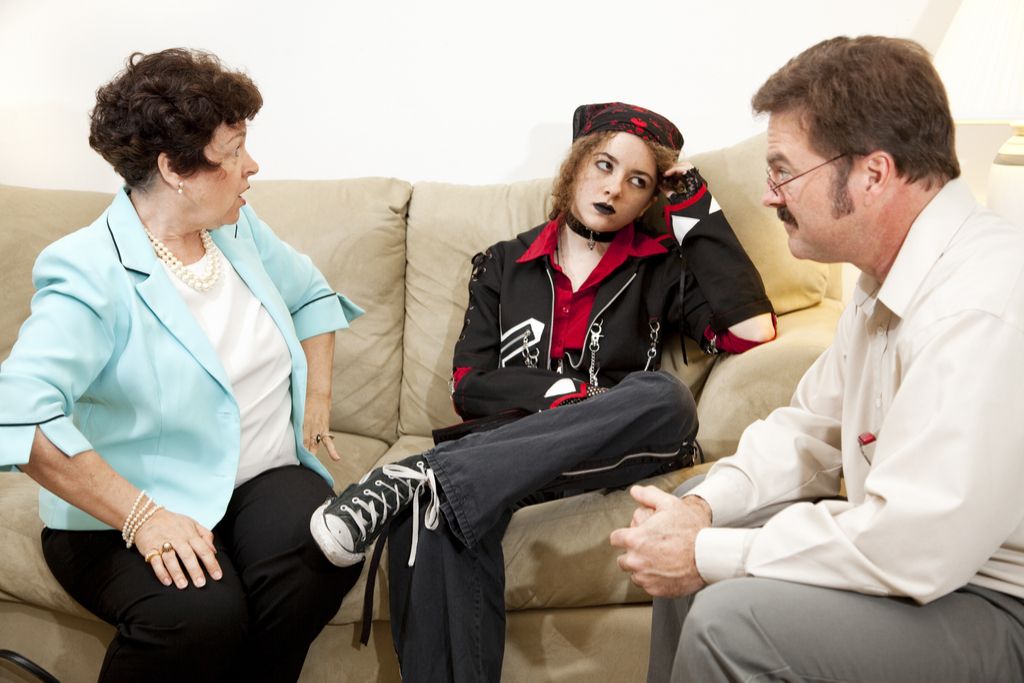
When your daughter (or son) begins to experiment with different makeup and fashion choices, the last thing that you want to do is make them feel self-conscious. Instead, put in an effort to take them to makeup classes, or, even, better yet, give them the freedom to experiment on their own terms. They will thank you for this freedom of expression later in life.
10
"That outfit doesn't look good on you."

Again, unless they're breaking dress code or wearing something extremely offensive, don't question your kids' freedom of expression. If nothing else, they'll have some hilarious fashion fails to look back on, just like every other human.
11
"Ugh. You're just like your mother."

There's nothing worse than simultaneously putting down your spouse and kid with this line. And, according to Crystal Rice, a licensed social worker, child therapist, and consultant at Insieme Consulting, this utterance makes your child feel forced to pick a side or look to please one parent over the over.
12
"You're an idiot!"

While no one is the perfect parent—and yes, we all let tempers loose—aiming this line at your child can be incredibly hurtful and damaging. After a derogatory term has been used, a child will most likely block out everything else that was said and just think about the name they were called.
13
"I don't know who ate your candy…"

C'mon—don't lie to your kids. According to a study performed by the Association for Psychological Science, using sarcasm at a young age will only make your children distrust you.
14
"Mommy's not crying. Everything's just fine!"

When it comes to spousal conflicts, kids are more perceptive than you might think, according to a study published in the Personality and Social Psychology Bulletin. As it turns out, shunning your own feelings may lead your kid down the same path later on in life.
15
"That's not very ladylike of you."
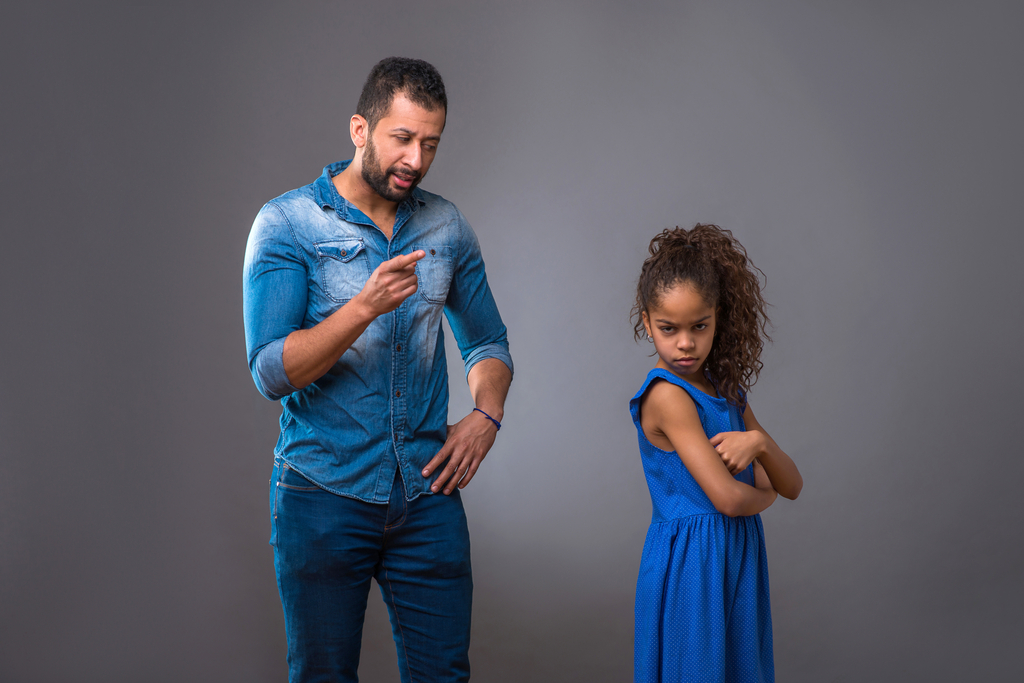
As a father, saying this line only comes off as sexist. Avoid this utterance if you're aiming to empower your daughter, instead of throwing societal expectations her way.
16
"Boys should fight back."
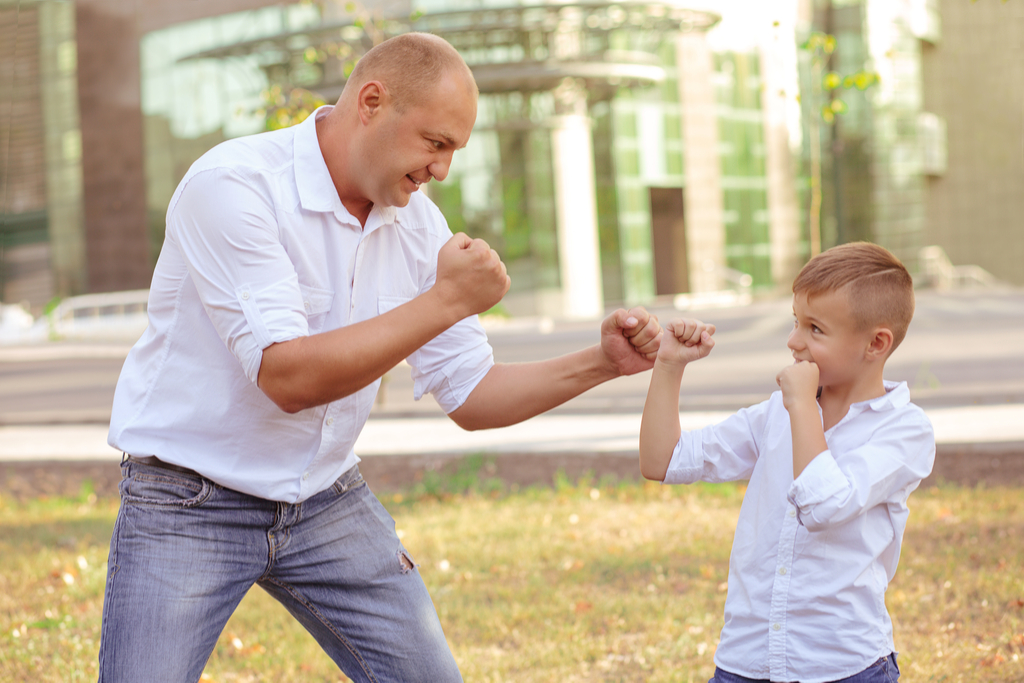
If your kid is being bullied, it can be easy to tell him (or her) to fight back. According to an article by CNN, teaching your kids to hit back (whether physically or metaphorically) only teaches them to use violence instead of calm and logical problem-solving.
17
"You're a boy. You're supposed to like sports."

Surprise, surprise—not all boys like sports…and not all girls like taking dance lessons. Let your kids pick their own hobbies and they'll thank you later.
18
"Stop crying."
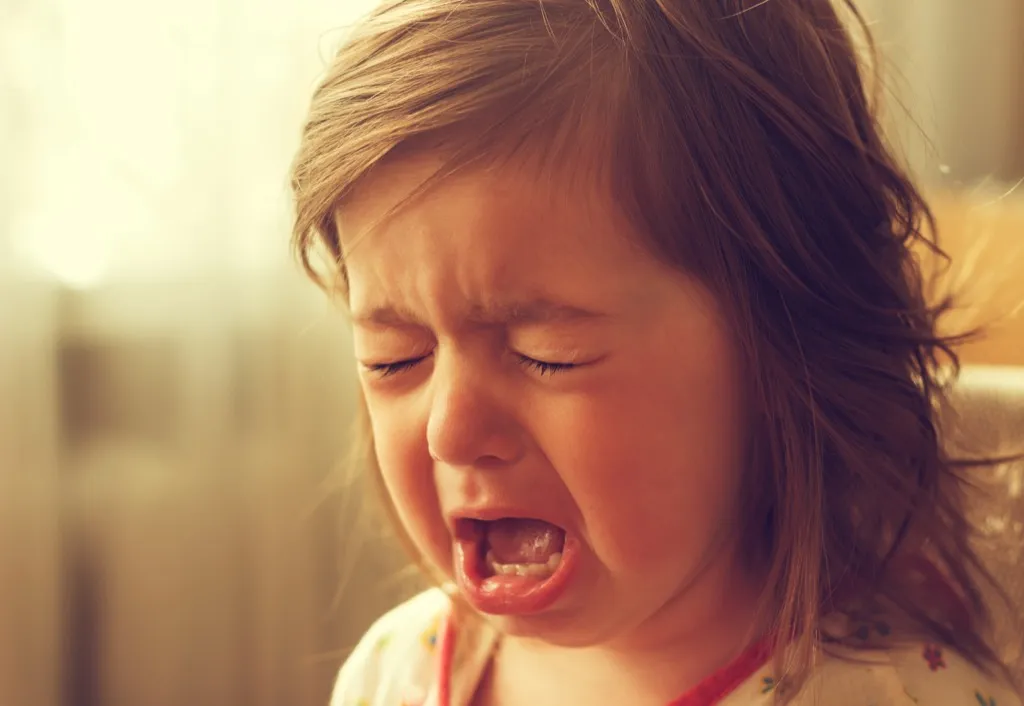
Again, invalidating your child's emotions is only going to make them more willing to ignore important feelings later in life, according to Debbie Glasser, Ph.D., director of Family Support Services at the Mailman Segal Institute for Early Childhood Studies at Nova Southeastern University. By discussing your child's feelings, you enable them to talk openly about what's ailing them—and also proving that you'll always be there for them.
19
"Stop being such a girl."

This is another sexist retort that you, especially as a male, have no right to say to your children. By comparing bad or weak behavior to "being such a girl," you're basically implying that being a woman is beneath them—which of course it isn't.
20
"Man up."

This is another instance where you're comparing weakness to being a woman. Just don't do it, man.
21
"Great job."

While positive reinforcement is always great, you might be overdoing it a bit, according to Jim Taylor, Ph.D., psychology professor at the University of San Francisco. Instead of praising them for every good deed or accomplishment (finishing a meal is not worthy of praise), focus on complimenting their greater achievements. And instead of giving a general compliment, make it more personalized so they know exactly what they did right.
22
"We can't afford that."

When you stress about money, your kid also stresses about money. Instead, when the budget doesn't allow for a new toy or gadget, just make it a point to tell them the truth—that they're saving for more important purchases. This habit will make your kid more likely to save money instead of spending it immediately.
23
"Be careful."

According to Petra Eperjesi of the Child and Nature Alliance of Canada, saying this to your child while attempting a daring act can instill a certain unneeded fear into them—one that should not necessarily always be there. So, the next time your child is on the monkey bars, just let them have a bit of fun without your worry clouding their good time.
24
"You're a bad kid."
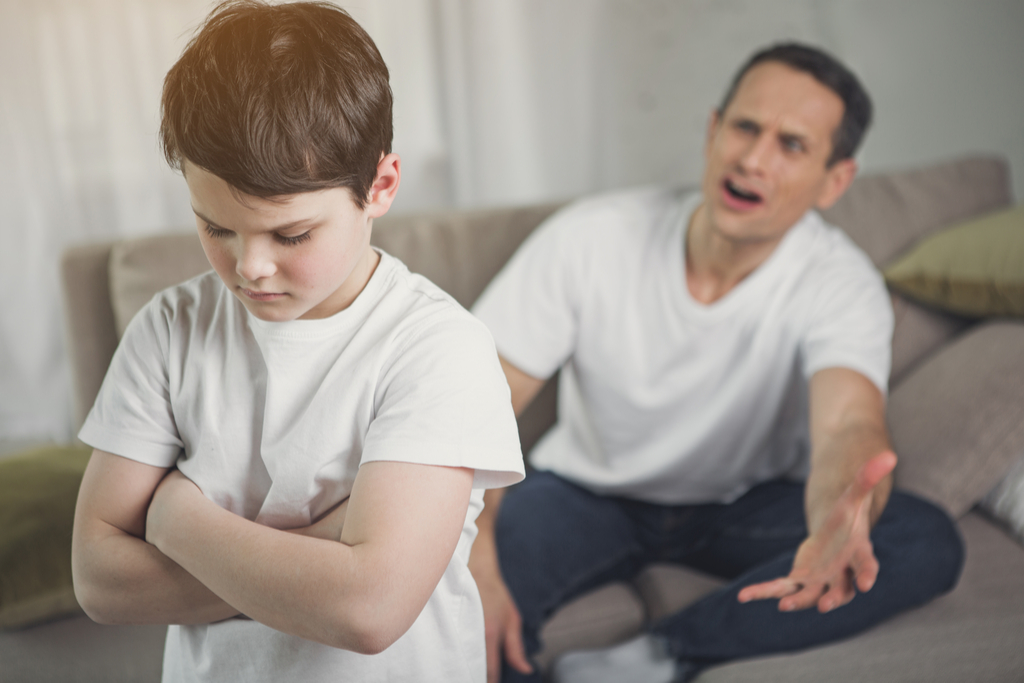
This one should be a no-brainer.
25
"You let your team down."
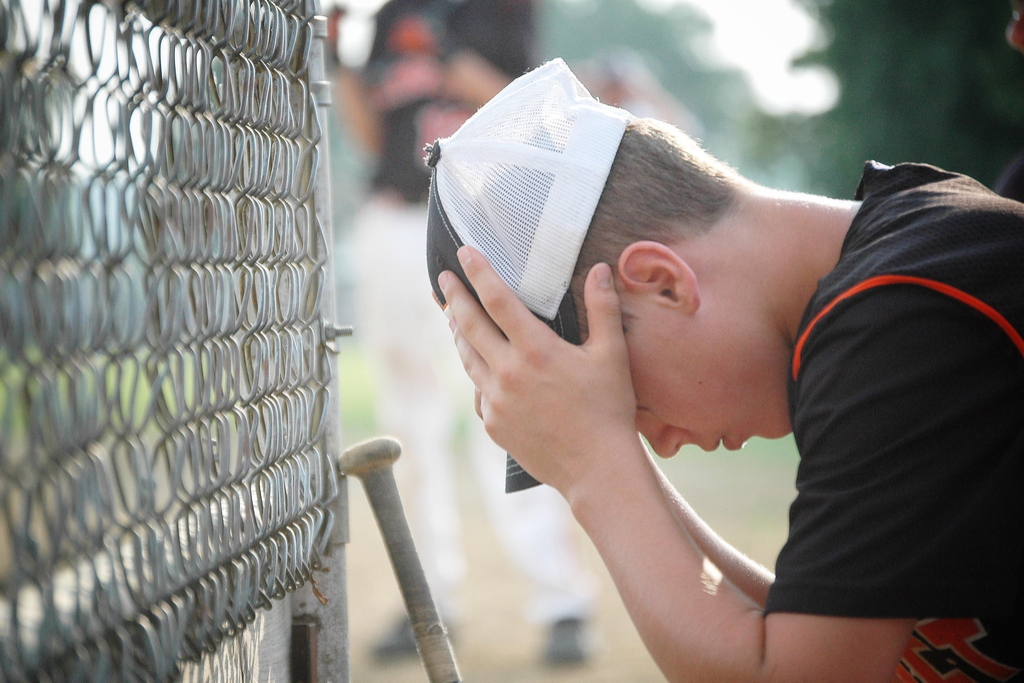
Let's face it—if your child made a mistake that cost their team the game, they're already feeling that guilt. There's no need to point out the flaws that they are already aware, says sports psychologist Ciarán Dalton. Instead, assure them that everyone makes mistakes—and encourage them to get back on the field to improve their skills.
26
"I'm too busy."
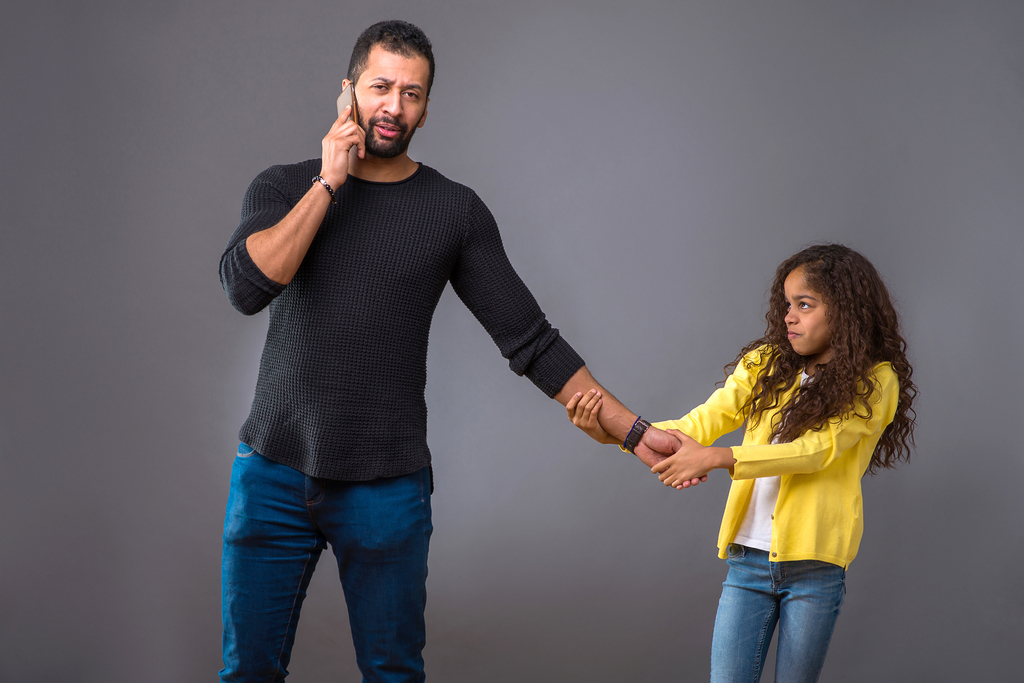
Sure, you may be swamped at work, but when your kids are looking to spend time with you—or even ask a homework question—you should make it a common practice to avoid uttering this phrase. Not only will it tell them that you don't have time for them, it will also make them trust you less. You can always find the time for your kids.
27
"You have awful taste in music/movies/art/sports."

Instead of criticising their taste, try to get to know their favorite bands, artists, and sports teams. You never know, you may have just found a new way to bond with your child.
28
"When I was your age, I had the hottest girlfriend."

Make it a point to not objectify women around your children, or they are likely to follow in your footsteps.
29
"Your mom spends more money on shoes than she does on you."

Whether you're still with your co-parent or not, you should always respect them in front of your children, according to divorce and parenting coach Rosalind Sedacca. Simply put, you will lose your children's trust and give them unwanted anxiety and depression through bad-mouthing your co-parent. There's no need to drag innocent children into a fight that's only between yourself and the co-parent.
30
Nothing.

We shouldn't have to tell you that barely-there fathers can significantly damage a child. When you're not there, or choose to be silent during important moments, it can seriously damage your child's self-worth and trust, according to a study performed by scholars at Princeton University, Cornell University, and the University of California, Berkeley. These issues have been linked to, among many other things, lower high school graduation rates and increased drug use in teens.
To discover more amazing secrets about living your best life, click here to follow us on Instagram!





















